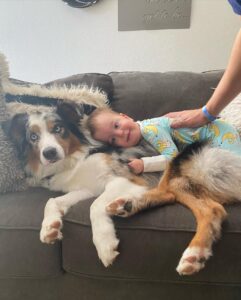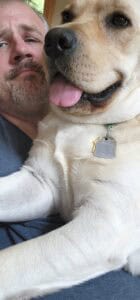By Miriam Bernard
Whether they bark, purr, squeak or blow bubbles, our friends from the animal kingdom are part of our families. You may be interested to know, however, that research shows pets and service animals can be catalysts in bringing about positive change in neurodivergent family members. Read on to hear from some NODCC community members whose lives have been positively impacted by pet ownership, and four ways having a special animal in your household can bring joy and calm to your DCC family member’s life!
1. Companionship/Friendship – Pets provide unspoken companionship and friendship to individuals who may have difficulty expressing their emotions with others. Often, the bond between human and animal transcends other human to human interaction, but provides a similar amount of calm and joy for the pet owner. An article from the ABA Centers for America states, “For many [with developmental disabilities], pets provide a unique social bond that is not available by any other means. Research suggests that having a pet promotes prosocial behaviors. Pets help to foster shared interactions like conversations and smiles. The arrival of a pet into any person’s life can be transformative.”
2. Social Skills – According to ausome.com‘s article “The Bond Between Neurodiversity and Pets”, “Improvements in social skills can be achieved with the help of therapists, like occupational and behavioral therapists. Research, however, has found that learning social skills can also begin with the help of a different species altogether. Pets may provide a variety of benefits … by offering company. ” Individuals with DCC may absorb the positive energy of their pets and move toward learning and participating in social skills. Persons who engage with animals tend to acquire stronger social skills as a result of the affection shown by pets. This enables neurodivergent individuals to feel at ease in a variety of contexts and recognize appropriate behavior.
3. Emotional Assistance – Neads.org, a website for connecting families of neurodivergent individuals with service dogs, explains how service animals provide more than physical help. They can help with behavioral skills as well, such as regulating emotions, easing transitions, and mitigating fears. Their website states, “Transitions are often difficult to navigate for children with autism and other developmental disabilities. A Service Dog can serve as a focal point, for example, when the child first returns home from school or is anticipating a doctor’s visit. NEADS Service Dogs accompany their partner to doctor’s appointments, restaurants, sporting events, and other public places and help the child deal with these transitions. For some children, exercising their dog becomes a transitional tool that allows them to more easily move to the next activity. Lastly, tasks can be used to help a child with his or her fears. For example, the task of turning on a light switch can be used if child has a fear of the dark.”
4. Independence and Personal Responsibility – For both children and adults with a DCC, the step toward acquiring a pet can be paramount in gaining independence, and especially so for adults. Gray Atherton of Edge Hills University worked on a study of adults, many of whom had developmental disabilities. Atherton stated, “For many, getting a pet was a huge breakthrough, helping them break out of unhealthy routines which could be quite liberating. I think the main takeaway is that despite worries that they can’t look after animals, people diagnosed with [developmental disabilities] are often capable of looking after animals and can see huge benefits from doing so.” Neads.org also shares that “The Service Dog is a teaching tool. Assigning daily chores such as feeding, brushing and cleaning up after the dog can teach a child responsibility and routine. Assisting with this care can translate into an awareness of and interest in his or her own self-care. [Therapy animals can also] reduce resistance to going to the doctor and other appointments. Parents can use taking the dog to the vet as a model for the child’s visit to a doctor, therapist, dentist or other professional.”
Here are some pet ownership experiences from our fellow NODCC members:



Dirk Ykema: We have two cats, named Faith and Larry, and a dog named Samantha. The cats are both odd but very loving, and the dog is well-behaved, silly, and encourages exercise. Pets can be a big responsibility, but the payoff can be even greater. If you consider getting a pet, you definitely want to find a pet, no matter what kind it is, with a gentle temperament.

Additional Resources/Research Referenced in this Article:
- 5 Types of Animal Therapy for Autism
- NEADS Service Dogs information
- The Bond Between Neurodiversity and Pets
- New research shows that pet ownership can improve the lives of people with autism

